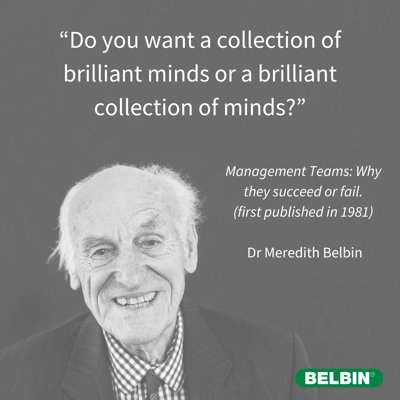Unpicking ‘clever’: teams, intellect and individual endeavour in Apollo teams
“Before we tinker with the team design, let’s verify the basic principles. In a business simulation exercise that places an emphasis on cleverness, the cleverest teams should win.”
So said Dr Meredith Belbin (or words to that effect) to his research team at the Administrative Staff College at Henley fifty years ago.
Imagine their surprise when that team of intellectuals finished last. And again, and again.
These teams shared certain characteristics too. They were difficult to manage, prone to destructive debate and encountered significant difficulties with decision-making.
Apollo Team Syndrome
The researchers called the phenomenon Apollo Team Syndrome after the first of these teams who, despite a promising membership with strong analytical skills and impressive academic credentials, foundered at every turn, resulting in poor team performance.
But why?
We know that individual performance need not be antithetical to team performance. High-performing individuals can perform well in teams, and that recognition of their achievements boosts team performance. In fact, it’s a more effective strategy than offering team-based rewards.
So why didn’t lots of high-performers translate into a high-performing team? Why did the lack of coherent teamwork “nullify the gains of individual effort or brilliance”, as Dr Belbin so eloquently put it?
To answer that question, let’s delve a little deeper into what was happening inside these Apollo teams.
Inside an Apollo team
The Apollo teams shared a number of ‘destructive tendencies’.
- Debate was often abortive, ego-driven and not constructive. It consisted in identifying weaknesses in others’ ideas to prove superior critical skills, rather than seeking to build consensus. But since no one capitulated, it succeeded only in causing rifts and divisions.
- Subsequently, the team lacked cohesion. Since agreement could not be reached, the team was unable to produce a coherent strategy. Team members operated separately, so competing strategic demands resulted in rivalry, omissions and one-upmanship. This drained resources and made the team all but impossible to manage.
- Recriminations damaged trust. When the team members realised their losses, they were quick to place blame at one another’s doors. Whilst this may not have mattered much for the purposes of a management game, it would certainly impair psychological safety in a real team, further damaging their future prospects.
- Attempts to ‘harmonise’ resulted in ambiguity. In some cases, the teams were able to identify too much debate as the problem. Instead of seeking a healthy equilibrium, they over-compensated by attempting to avoid conflict altogether. However, this in itself caused further problems with decision-making. Ideas were left in mid-air, so the team’s objectives were unclear to its members.
There were some exceptions to the rule, and these can provide an important insight into the relative successes and failures.
The members of these teams might be said to have had a narrow definition of ‘clever’.
Their identity was predicated on intellect. They overvalued it (both in themselves and in others) and undervalued other contributions, which were sorely neglected in their teams.
By seeking out like-minded colleagues whom they admired, they got the colleagues they wanted and didn’t need: those who would compete in the same arena, leading to a loss of identity within the team and so to role confusion.
In many cases, traditional education sets us up for a fall in this regard, leading us to value academic credentials and providing a poor training-ground for teamwork. In his book, Management Teams: Why They Succeed or Fail, Dr Belbin writes:
“Those who at school are ‘top of the class’, or who have it within their reach, are continually being judged in terms of their scholastic pre-eminence. To come second is to fail. Beating the next person is the name of the game. In other words, overconcentration on coming top of the class provides an unconscious training in anti-teamwork.”
Cracking Apollo syndrome: choosing leaders, choosing teams
Apollo team members each saw themselves as skilled critical thinkers, proficient at devising solutions to problems. As such, they saw little differentiation between their own role and those of the team leader. Of course, this led to further competition, with those unable to discharge a leadership role causing further disruption the group.
However, there were examples of relative success in the Apollo teams. This occurred when there were fewer dominant team members, so a more sceptical leadership style emerged, with leaders ensuring that discussion resulted in outcomes. This kind of leader set objectives and priorities and was tough enough to hold ground without competing for authority.
Another possible indicator of success, according to Dr Belbin, was found in the composition of teams. Where leaders were allowed to compose teams according to their own criteria (namely personal preference), Dr Belbin found that individuals took more collective responsibility for the team’s efforts and succeeded in avoiding the usual pitfalls. They tended to choose people with different skills too. This fostered interdependence which could engender trust.
Many teams and organisations might talk the talk about celebrating diversity, but how often is cognitive diversity really understood as a precursor to high performance?
For the Apollo teams, individual endeavour – or even engagement – was not enough.
Their failure to value anything other than academic prowess and critical thinking led to their downfall.
Recognising diverse skills and abilities doesn’t mean simply paying lip service, but challenging our own assumptions as to what constitutes a valuable contribution. Seeking out cognitive diversity in our teams fosters healthy interdependence where homogeneity might result in internal competition.

